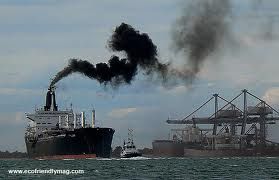
Climate change in the Arctic is not likely to spark an immediate boom in oil and gas exploration, according to a new study published in the journal Atmospheric Chemistry and Physics.
But it will increase shipping there, and shipping-related emission of greenhouse gases will intensify in the region.
The article, by researchers at the Oslo-based Center for International Climate and Environment Research (CICERO), Det Norske Veritas and Statistics Norway, predicts that while ship exhaust will not rise significantly globally, it will in the Arctic. In particular, the study says, there will be “a considerable change in the location of emissions” as fishing boats proliferate along the coast and some shipping vessels move through.
Glen Peters, a senior research fellow at CICERO and the study’s lead author, said shipping companies will have more of an incentive to operate in Arctic waters than oil and gas companies.
“It’s still tough, in terms of the Arctic,” Peters said, referring to energy extraction in a phone interview. “Even though the ice might recede a little bit, you still have ice in the winter.”
Summer ice could disappear much sooner, the authors note, with some experts predicting that the Arctic could be ice-free in September as early as 2030. Since travel time between Europe and the northern Pacific could be cut in half by traversing the Arctic, the authors write in the June 6 article, “use of this route could increase substantially as the sea-ice retreats.”
The researchers used both a computer model of commercial shipping and one of global energy markets to predict how emissions could change in the region over time. There is virtually no container trade between Asia and Europe through the Arctic right now; the researchers estimate that about 8 percent of container trade will travel through the Arctic in 2030, rising to about 10 percent in 2050.
This shift will result in more shipping-related emissions in the region, the scientists conclude, but they add that “compared to the business as usual case (no Arctic transit) there is a reduction in global fuel consumption in the shipping sector . . . as the Arctic transit is shorter than shipping via the Suez Canal.”
The study found emissions in the Arctic from oil and gas exploration, by contrast, are not likely to increase significantly. “Production will be relatively stable,” Peters said, adding that when it comes to pollution, “the new installations will have better technology in terms of emissions.”
The researchers noted that the price of oil could play a critical role in determining the level of production in the Arctic: If oil rose to $120 a barrel, for example, it could spur a significant expansion of drilling in the area.
Some oil and gas firms, such as Russia’s Rosneft, have indicated that they plan to expand their activities in the Arctic in the near term. And on Friday, the Environmental Protection Agency issued draft air-quality permits for Shell Oil’s exploratory drilling operations in Alaska’s Arctic waters.
Sen. Lisa Murkowski (R-Alaska) welcomed the EPA’s action, noting that the original permits for the spring of 2010 were overturned on appeal by the agency’s Environmental Appeals Board.
“Alaska’s offshore resources represent our greatest potential to develop the energy we currently rely on to drive our economy,” Murkowski said in a statement. “While we must ensure development is done responsibly, we must also have a regulatory process that provides companies willing to invest in our economy assurance that their applications will be processed in a timely manner.”
Scientists are now looking into whether a spike in emissions in certain parts of the Arctic, which is warming much faster than the rest of the globe, will affect the region disproportionately. “Those calculations are ongoing,” Peters said.
Source: Washington Post
We use cookies to improve your experience. By continuing to use our site, you accept our Cookies, Privacy Policy,Terms and Conditions. Close X